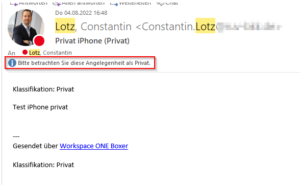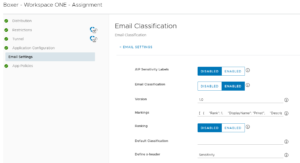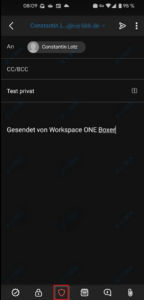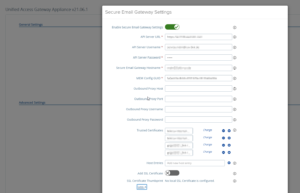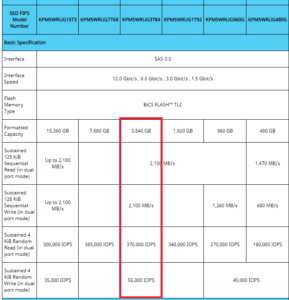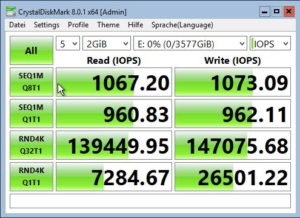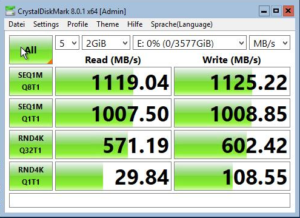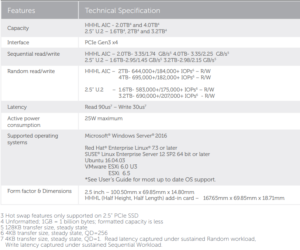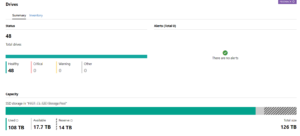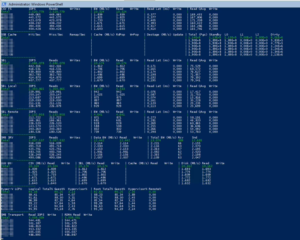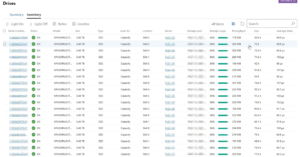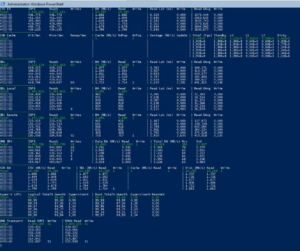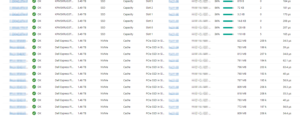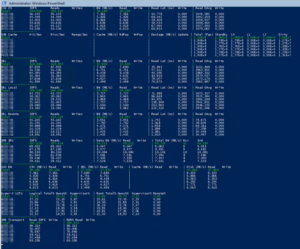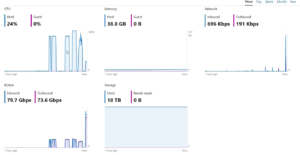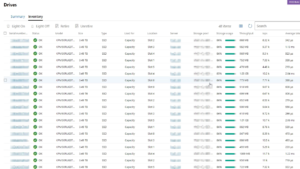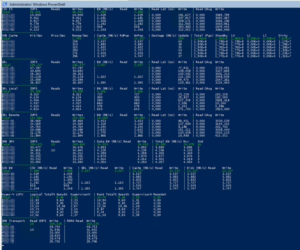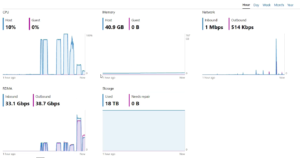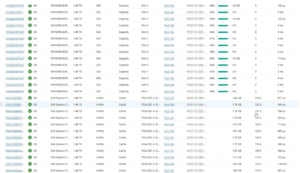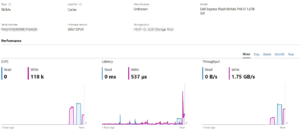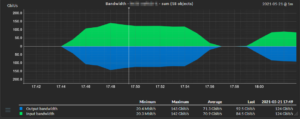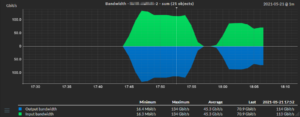Für die Konfiguration von Webservern und Dienste hat das BSI eine entsprechende technische Richtline (BSI TR-03116-4 Kryptographische Vorgaben für Projekte der Bundesregierung Teil 4 Stand 2023) veröffentlicht, die im wesentlichen für einige Behörden Anwendung findet.
Diese regelt welche kryptografischen Verfahren wie z.B. TLS 1.2 / TLS 1.3 und die dazugehörigen Signatur und Ciphers für die Übertragung verwendet werden dürfen.
Wer jetzt denkt: Ich habe doch schon eine A+ Bewertung bei ssllabs.com sollte hier nochmal genauer hinsehen. Die BSI-TR-03116-4 ist leider deutlich strikter. Hier gibt es unter anderem noch die Vorgabe, dass alle Zertifikate (also die komplette Zertifikatskette) mit einem privaten Schlüssel mit mind. 3072bit generiert worden sein. Das ist mit manchen CA-Anbietern wie z.B. Letsencrypt aktuell nicht möglich, da die Root-Zertifikate teilweise noch mit 2048bit erstellt worden sind. Wenn ihr hier kostenfreie funktionierende Alternativen gefunden habt, lasst es mich wissen.
Über die Webseite tls-check.de von Achelos könnt ihr eure Konfiguration schnell und online prüfen. Für rein lokal gehostete Instanzen gibt es Projekte auf Github wie z.B. den tlsassistant.
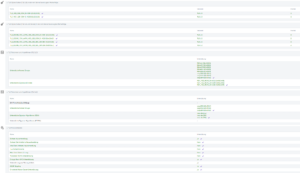
Für die wesentlichen Webserver wie Apache2 und NGINX liefere ich euch hier jeweils eine Beispielkonfiguration die für TR-03116-4 konform ist. Wenn ihr z.B. noch Apache Tomcat haben solltet, lasst uns gerne austauschen.
Voraussetzungen
- Ihr braucht eine aktuelle apache2 / nginx Version
- Manche Features sind nur in neueren Versionen enthalten. Bei Nginx lohnt es sich z.B. von der Ubuntu Version auf die eigene ppa von Nginx zu wechseln.
- Ihr braucht eine aktuelle openssl Version
- Speziell die SSLOpenSSLConfCmd Befehle basieren auf der Openssl Version. Ihr braucht hier mind. openssl 1.1.1f oder openssl 3.x+
- Lässt sich mit „openssl version“ prüfen.
Apache2
<VirtualHost *:80>
ServerName example.com
ServerAdmin admin@example.com
# Redirect all HTTP traffic to HTTPS
Redirect / https://example.com
ErrorLog /var/www/html/example.com/logs/error.log
CustomLog /var/www/html/example.com/logs/access.log combined
</VirtualHost>
# SSL Stapling
# Specify the OCSP cache response location and size
SSLStaplingCache "shmcb:logs/stapling-cache(150000)"
<VirtualHost *:443>
ServerName example.com
ServerAdmin admin@example.com
DocumentRoot /var/www/html/example.com/web
SSLEngine on
SSLCertificateFile /etc/apache2/ssl/example_com_2025.cer
SSLCertificateKeyFile /etc/apache2/ssl/example_com_2025.key
# =========================================================================
# TLS Protocols
# Only allow TLS 1.2 and TLS 1.3 (disabling older protocols).
# BSI-TR-03116-4 recommends using at least TLS 1.2 with secure cipher suites.
# =========================================================================
SSLProtocol -all +TLSv1.2 +TLSv1.3
# =========================================================================
# Cipher Suites
# Enforce server-preferred order and specify strong cipher suites.
# Adjust as new ciphers are recommended or deprecated.
# =========================================================================
SSLHonorCipherOrder On
# For TLS 1.3:
SSLCipherSuite TLSv1.3 TLS_AES_256_GCM_SHA384:TLS_AES_128_GCM_SHA256
# For TLS 1.2:
SSLCipherSuite ECDHE-ECDSA-AES256-GCM-SHA384:\
ECDHE-ECDSA-AES128-GCM-SHA256:\
ECDHE-RSA-AES256-GCM-SHA384:\
ECDHE-RSA-AES128-GCM-SHA256:\
ECDHE-RSA-AES256-SHA384:\
ECDHE-RSA-AES128-SHA256
# SSLLABS Reported WEAK Ciphers: ECDHE-RSA-AES256-SHA384:ECDHE-RSA-AES128-SHA256
# Disable compression to prevent CRIME attacks
SSLCompression Off
# Enable or disable session tickets depending on your security stance
SSLSessionTickets On
# Named curves for ECDH key exchange (TLS 1.2 & 1.3)
SSLOpenSSLConfCmd Curves X25519:secp521r1:secp384r1:prime256v1
# Signature algorithms for TLS 1.2
SSLOpenSSLConfCmd SignatureAlgorithms \
"ECDSA+SHA512:ECDSA+SHA384:ECDSA+SHA256:\
RSA+SHA512:RSA+SHA384:RSA+SHA256:\
rsa_pss_rsae_sha512:rsa_pss_rsae_sha384:rsa_pss_rsae_sha256"
# OCSP Stapling: provides the client with certificate status information
SSLUseStapling on
# HTTP Strict Transport Security (HSTS)
Header always set Strict-Transport-Security "max-age=15768000"
# Security headers
Header always set X-Content-Type-Options "nosniff"
Header set Content-Security-Policy \
"default-src 'self' data: 'unsafe-inline' 'unsafe-hashes' 'unsafe-eval' *.example.com; \
frame-ancestors 'self' *.example.com; \
base-uri 'self' *.example.com; \
script-src 'self' data: 'unsafe-inline'"
Header set Referrer-Policy "no-referrer"
Header set X-XSS-Protection "1; mode=block"
ErrorLog /var/www/html/example.com/logs/error.log
CustomLog /var/www/html/example.com/logs/access.log combined
</VirtualHost>
NGINX
server {
# Listen on port 443 for SSL/TLS connections (IPv4 and IPv6).
listen 443 ssl;
listen [::]:443 ssl;
# Enable HTTP/2 support.
http2 on;
# Hostname this server block responds to.
server_name example.com;
# SSL certificate and key paths (adjust as needed).
# The lines below are active ones:
ssl_certificate /etc/nginx/ssl/cert.crt;
ssl_certificate_key /etc/nginx/ssl/cert.key;
# Uncomment and specify if using custom Diffie-Hellman parameters.
# ssl_dhparam /etc/ssl/certs/dhparam.pem;
# SSL session settings: improves performance by allowing session reuse.
ssl_session_timeout 5m;
ssl_session_cache shared:SSL:50m;
ssl_session_tickets on;
# Enabled TLS protocols (recommend keeping TLSv1.2 and TLSv1.3).
ssl_protocols TLSv1.3 TLSv1.2;
# Prefer server ciphers over client-proposed ciphers.
ssl_prefer_server_ciphers on;
# Strong ciphers for TLS 1.2 and also includes TLS 1.3 ciphers.
# Note that TLS 1.3 ciphers (TLS_AES_*) are negotiated separately in most modern OpenSSL.
ssl_ciphers "ECDHE-ECDSA-AES256-GCM-SHA384:ECDHE-ECDSA-AES128-GCM-SHA256:ECDHE-RSA-AES256-GCM-SHA384:ECDHE-RSA-AES128-GCM-SHA256:TLS_AES_256_GCM_SHA384:TLS_AES_128_GCM_SHA256:ECDHE-RSA-AES256-SHA384:ECDHE-RSA-AES128-SHA256";
# SSL LABS Reported WEAK: ECDHE-RSA-AES256-SHA384 & WEAK:ECDHE-RSA-AES128-SHA256
# Explicitly define TLS 1.3 cipher suites (for OpenSSL 1.1.1+).
ssl_conf_command Ciphersuites TLS_AES_256_GCM_SHA384:TLS_AES_128_GCM_SHA256;
# Specify curves for ECDH (used in TLS 1.2).
ssl_ecdh_curve X448:secp521r1:secp384r1:secp256r1;
# Set Named Groups for TLS 1.3 key exchange.
ssl_conf_command Curves ffdhe2048:ffdhe3072:ffdhe4096:ffdhe6144:ffdhe8192:secp256r1:secp384r1:secp521r1;
# Configure signature algorithms for TLS 1.2 and 1.3.
ssl_conf_command SignatureAlgorithms "ECDSA+SHA512:ECDSA+SHA384:ECDSA+SHA256:RSA+SHA512:RSA+SHA384:RSA+SHA256:rsa_pss_rsae_sha512:rsa_pss_rsae_sha384:rsa_pss_rsae_sha256";
# Enable and verify OCSP stapling for better SSL performance and security.
ssl_stapling on;
ssl_stapling_verify on;
# Security headers
add_header Strict-Transport-Security "max-age=15768000; includeSubDomains; preload;" always;
add_header Permissions-Policy "interest-cohort=()";
add_header Referrer-Policy "no-referrer" always;
add_header X-Content-Type-Options "nosniff" always;
add_header X-Download-Options "noopen" always;
add_header X-Frame-Options "SAMEORIGIN" always;
add_header X-Permitted-Cross-Domain-Policies "none" always;
add_header X-Robots-Tag "noindex, nofollow" always;
add_header X-XSS-Protection "1; mode=block" always;



